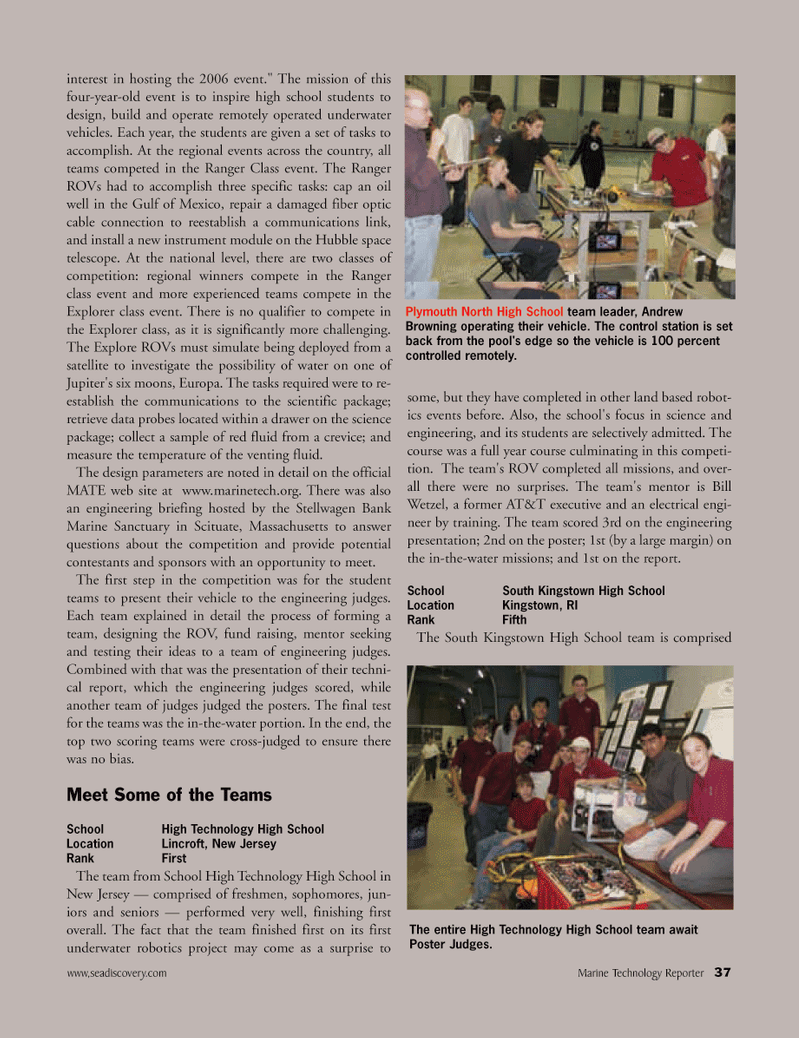
Page 36: of Marine Technology Magazine (July 2005)
Read this page in Pdf, Flash or Html5 edition of July 2005 Marine Technology Magazine
interest in hosting the 2006 event." The mission of this four-year-old event is to inspire high school students to design, build and operate remotely operated underwater vehicles. Each year, the students are given a set of tasks to accomplish. At the regional events across the country, all teams competed in the Ranger Class event. The Ranger
ROVs had to accomplish three specific tasks: cap an oil well in the Gulf of Mexico, repair a damaged fiber optic cable connection to reestablish a communications link, and install a new instrument module on the Hubble space telescope. At the national level, there are two classes of competition: regional winners compete in the Ranger class event and more experienced teams compete in the
Explorer class event. There is no qualifier to compete in the Explorer class, as it is significantly more challenging.
The Explore ROVs must simulate being deployed from a satellite to investigate the possibility of water on one of
Jupiter's six moons, Europa. The tasks required were to re- establish the communications to the scientific package; retrieve data probes located within a drawer on the science package; collect a sample of red fluid from a crevice; and measure the temperature of the venting fluid.
The design parameters are noted in detail on the official
MATE web site at www.marinetech.org. There was also an engineering briefing hosted by the Stellwagen Bank
Marine Sanctuary in Scituate, Massachusetts to answer questions about the competition and provide potential contestants and sponsors with an opportunity to meet.
The first step in the competition was for the student teams to present their vehicle to the engineering judges.
Each team explained in detail the process of forming a team, designing the ROV, fund raising, mentor seeking and testing their ideas to a team of engineering judges.
Combined with that was the presentation of their techni- cal report, which the engineering judges scored, while another team of judges judged the posters. The final test for the teams was the in-the-water portion. In the end, the top two scoring teams were cross-judged to ensure there was no bias.
Meet Some of the Teams
School High Technology High School
Location Lincroft, New Jersey
Rank First
The team from School High Technology High School in
New Jersey — comprised of freshmen, sophomores, jun- iors and seniors — performed very well, finishing first overall. The fact that the team finished first on its first underwater robotics project may come as a surprise to some, but they have completed in other land based robot- ics events before. Also, the school's focus in science and engineering, and its students are selectively admitted. The course was a full year course culminating in this competi- tion. The team's ROV completed all missions, and over- all there were no surprises. The team's mentor is Bill
Wetzel, a former AT&T executive and an electrical engi- neer by training. The team scored 3rd on the engineering presentation; 2nd on the poster; 1st (by a large margin) on the in-the-water missions; and 1st on the report.
School South Kingstown High School
Location Kingstown, RI
Rank Fifth
The South Kingstown High School team is comprised
Plymouth North High School team leader, Andrew
Browning operating their vehicle. The control station is set back from the pool's edge so the vehicle is 100 percent controlled remotely.
The entire High Technology High School team await
Poster Judges. www,seadiscovery.com Marine Technology Reporter 37
MTR#1 (33-48).qxd 7/19/2005 9:54 AM Page 37

 35
35

 37
37
